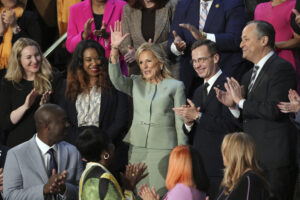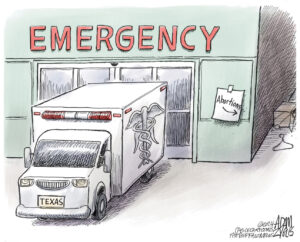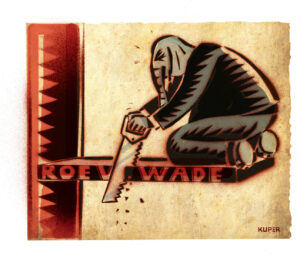Religious Conviction vs. Political Dogmatism
Evangelical Protestantism in the United States is going through a New Reformation that is disentangling a great religious movement from a partisan political machine. This historic change will require liberals and conservatives alike to abandon their sometimes narrow views of who evangelicals are.WASHINGTON — Evangelical Protestantism in the United States is going through a New Reformation that is disentangling a great religious movement from a partisan political machine. This historic change will require liberals and conservatives alike to abandon their sometimes narrow views of who evangelicals are.
The reformers won an important victory this month when the board of the National Association of Evangelicals faced down right-wing partisans and reaffirmed their view that healing global warming was an important moral cause. In so doing, they also expressed confidence in the Rev. Rich Cizik, the NAE’s vice president for governmental affairs.
Cizik, who combines opposition to abortion with a firm commitment to human rights, the poor and the environment, came under attack from a gang of ideologues who would freeze evangelicals on a political course set more than a quarter-century ago.
“This tussle over the issue of climate change is part of a bigger tussle over the definition of evangelicalism and who speaks for evangelicals,” Cizik said in an interview.
Calling upon evangelicals to “return to being people who are known for our love and care for our fellow human beings and the Earth,” Cizik warned that “if you put the politics first and make it primary, I believe that is a tragic and fateful choice.”
Since 1980, white evangelical Christians have been seen primarily as a Republican voting bloc. They delivered more than three-quarters of their ballots to President Bush in the 2004 election.
This is no accident. In 1979, a group of conservative activists led by Paul Weyrich of the Free Congress Foundation and Morton Blackwell, a Republican national committeeman from Virginia, went to the Rev. Jerry Falwell, urging him to organize what became the Moral Majority.
Their primary goal was not religious but political: to enlist evangelicals behind conservative Republican candidates. Blackwell candidly called evangelicals “the greatest track of virgin timber on the political landscape.” They reaped a mighty load.
The Christian Coalition was equally political in its inspiration. Emerging from Pat Robertson’s unsuccessful bid for the 1988 Republican presidential nomination, it sought to advance his influence in the party.
The political maestros can’t abide any serious evangelical Christian daring to broaden the agenda beyond the limited set of issues (notably abortion and gay rights) that keep the faithful voting Republican. Cizik was a threat. And so they attacked him in a March 1 letter to the board of the NAE. It was signed by such conservative luminaries as Weyrich, James Dobson of Focus on the Family, Don Wildmon of the American Family Association, Tony Perkins of the Family Research Council, and Gary Bauer, who ran for the 2000 Republican presidential nomination.
“Cizik and others,” they said, “are using the global warming controversy to shift the emphasis away from the great moral issues of our time, notably the sanctity of human life, the integrity of marriage and the teaching of sexual abstinence and morality to our children.”
Worse, they smeared Cizik because he had expressed a concern for world population in a 2006 speech at the World Bank. “We ask,” they wrote, “how is population control going to be achieved if not by promoting abortion, the distribution of condoms to the young, and, even by infanticide in China and elsewhere?”
Even to suggest that Cizik, given his record, favors abortion or infanticide was scandalous. (“My wife shows up in church,” Cizik laments, “and people ask her, ‘Is your husband pro-abortion and in favor of abortion as birth control?'”) It was also unpersuasive. The board of the NAE, with only a single dissenting vote, backed Cizik and the organization’s earlier stand on the importance of “creation care” in dealing with climate change
What makes this fight strange is that Cizik is no liberal. On the contrary, he supported Ronald Reagan twice and George W. Bush twice. He is still proud of his role in drafting the invitation to Reagan that led to the former president’s 1983 speech before the NAE calling the Soviet Union the “evil empire.”
Cizik simply rejects the idea that his environmental commitment runs contrary to his support for the anti-abortion movement: “Tell the parents of children who are mentally disabled because of mercury poising — tell them that the environment is not a sanctity-of-life issue,” he says.
“We should be primarily concerned with what the Gospel says,” Cizik insists, “not whether you’re getting off some political train.” Those are the words of a New Reformation. Many evangelicals are boarding a new train. It runs along tracks defined by the broad demands of their faith, not by some party’s political agenda.
E.J. Dionne’s e-mail address is [email protected].
© 2007, Washington Post Writers Group
Your support matters…Independent journalism is under threat and overshadowed by heavily funded mainstream media.
You can help level the playing field. Become a member.
Your tax-deductible contribution keeps us digging beneath the headlines to give you thought-provoking, investigative reporting and analysis that unearths what's really happening- without compromise.
Give today to support our courageous, independent journalists.






You need to be a supporter to comment.
There are currently no responses to this article.
Be the first to respond.